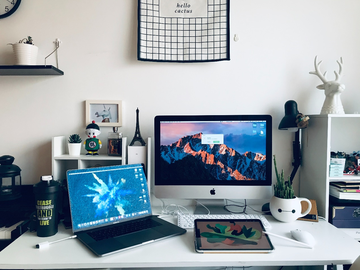For many companies, the interview is a vital link. In the past, companies often needed to spend a lot of time and energy to understand candidates' abilities. Therefore, in order to save time, cost and expenses, many companies will use virtual events for interviews. Although virtual interviews cannot wholly replace traditional interviews, they can significantly save time, staffing and economic costs. And in this particular period, virtual interviews greatly help job-seeking graduates.
What is Virtual Interview?
A virtual interview is a remote video interview based on a computer network. It uses communication technology and a video conferencing system to realize face-to-face communication between applicants and recruiters. Through this interview method, recruiters can obtain more information about candidates in a short period of time. The technology was first used in the recruitment of civil servants by the British government and then gradually spread to countries around the world. Virtual interviews can effectively avoid the embarrassment of "face-to-face". Through communication between applicants and network experts or staff, you can get more information about applicants from experts, test whether the applicant company is ideal, etc. This remote video interview method can also effectively alleviate the inconvenience caused by "distance". In foreign countries, virtual interviews are generally used to recruit senior talents, team management, etc.
Types of Virtual Interview
- Mock interview: Simulate the face-to-face conversation between the examiner and the candidate, assess the candidate according to the questions prepared in advance, and then input the assessment results into the computer.
- Remote interview: the interview is realized through modern communication technology. The format is an interview conducted remotely. It is implemented through the Internet, and the test is carried out by interactive operation between remote interview questions and interviewers. This kind of interview generally cannot directly examine the candidate's on-site work situation
- Scenario virtual interview: a simulated interview with the candidate and the company using a computer; the purpose is to understand whether the job requirements of the student and the employer match. , to understand the students' actual workability, level and adaptability. Different environments and situational conditions are set in the scenario simulation to examine the actual ability and quality of the students
- Structured interview: mainly through the applicant's logical thinking and organizational language when answering questions to examine the interviewer's on-site communication, solution, etc. Question ability, etc.
- Group interview: It is a comprehensive assessment and evaluation activity for candidates among enterprises. Organizing interviews this way is currently a more popular form of interviewer assessment. This form mainly examines the comprehensive quality and ability of the candidates.
Procedure of Virtual Interview
Candidates receive an email invitation to a virtual interview after applying for a job. In most cases, the process is generally the same, no matter the kind of interview taking place. Recruiters or hiring managers are responsible for reviewing the candidate's complete application, including a cover letter, resume, and interview. Once the interview is completed, the candidate's entire application is reviewed. Then it is up to the recruiter to decide whether to reject the candidate, proceed to the next round of the hiring process, or hire them outright. This process could take two weeks or several months, depending on the hiring process and the hiring climate.
Pros & Cons of Virtual Interview
Pros
- Save time and cost: In a short period of time, it is challenging to conduct face-to-face interviews with job candidates online, but virtual interviews can solve all this.
- Not limited by time and place: If you want to conduct a virtual interview, job seekers can have a comprehensive understanding of their basic information, educational background, work experience, etc., through the Internet.
- Communication enhancement: Communicating with others through the Internet can avoid unnecessary embarrassment and, at the same time, enhance relationships with others.
- Job seekers have more interview opportunities: During the interview process, because it is conducted on the Internet, you can choose from many different industries and companies' work locations and unit types, and you can make full use of the company's various resources to expand employment opportunities.
Cons
- The advantage of virtual interviews is that it saves recruitment costs. Still, due to the inability to communicate face-to-face, personal information may be leaked during the interview process.
- The result of the virtual interview may not match the actual situation. After the virtual interview, there may be doubts about the authenticity of the information and materials provided by the job seeker, which affects the decision-making of the employer's recruitment.
- Virtual interviews can easily lead to the appearance of "false applicants". Some applicants use themselves to pretend to be "false applicants" to apply for positions and defraud the information and materials provided by the company.
- Virtual interviews can leave a perception that integrity is not valued enough. Although virtual recruitment has solved the shortage and surplus of talent in some positions to a certain extent, it is not a panacea. Some posts may need to go through multiple "face-to-face" screenings before they can be finally hired.
Conclusion
To sum up, it goes without saying that virtual interviews are becoming increasingly common for many hiring processes, regardless of whether you are on the candidate's side or the recruiter's side.


